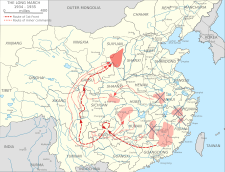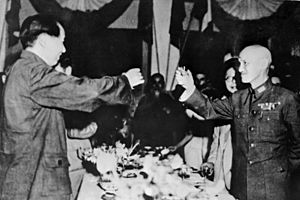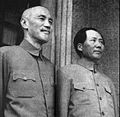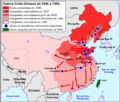Chinese Civil War facts for kids

The Chinese Civil War was a civil war fought from 1927 to 1951, because of a difference in thinking between the Chinese Communist Party (CCP) and the Nationalist Kuomintang (KMT). The war was a fight for legitimacy as the government of China. The war began in April 1927, because of the 'Northern Expedition" (國民革命軍北伐) and mostly ended in 1950. Some people say the war has not ended, but no large battles have started since that year. The relations between the Republic of China (ROC) and the People's Republic of China (PRC) are bad because both still say they are the legitimate sovereign government of all of China. The Chinese Civil War was the third largest war in all of time after World War II and World War I.
The war started and stopped several times before the Second Sino-Japanese War, and fighting did not stop during the fighting against the Empire of Japan. The war between the CCP and KMT started again in 1946 after Japan's defeat in World War II. CCP took control of most of China and KMT had only islands. About two million Chinese fled to Taiwan in late 1949. In 1950, no large battles were started.
- The loss of the KMT in Mainland China is said to be for several reasons:
- the Yan'an Rectification Movement helped Mao have more control of the CCP,
- the ceasefire a United States officer made in 1946 stopped the KMT for a time
- bad problems between the people and the KMT in the places of KMT control
- the Soviet Union giving the guns of the Japanese to the CCP
- uncertain help from the United States for the KMT.
No agreement was made between the two governments, so some say that the war has not ended. Both governments have many military weapons that is only to be used against the other, both still say they are the legitimate government of China, and each seeks diplomatic relations with other countries as the only legitimate government.
Before the war
After the fall of the Qing dynasty in the 1911 Xinhai Revolution, the country was thrown into turmoil. In the ensuing power vacuum, a large number of warlords seized control of different parts of the country. In order to defeat them and unify the country, Sun Yat-sen and the KMT sought help from foreign governments.
Though he made pleas to several Western democratic nations, none offered to help. It was only after turning to the Soviet Union in 1921 that Sun found aid. The communist Soviet Union agreed to help the KMT, under the condition that the smaller Chinese Communist Party be allowed to join. In 1923 the Soviet Union, KMT, and CCP made an agreement, the Sun-Joffe Manifesto, that said the Soviet Union would help China have one government and not many governments. Mikhail Borodin traveled to China in 1923 to help change the KMT to make it similar to the Communist Party of the Soviet Union. The CCP and KMT were joined in the First United Front.
In 1923 Chiang Kai-shek travelled to the Soviet Union to study military and politics with the Communist Party of the Soviet Union. In 1924 he became the leader of the Whampoa Military Academy in China. Most help from the Soviet Union was for this school. The school taught the political and military ideas of the Soviet Union to the KMT and CCP. The Soviet Union gave books and guns to use for teaching about war and military things. With the help from the Soviet Union, Sun Yat-sen made an "army of the party". Members of the CCP were also in the school and some were teachers. Zhou Enlai was a teacher in the school.
In this time the KMT agreed to let some communists join the KMT sometimes. In this time the CCP was small in comparison to the KMT. The CCP had 300 members in 1922 and only 1,500 by 1925. The KMT in 1923 had 50,000 members.
Images for kids
-
Republic of China FT tanks
-
Mao Zedong's proclamation of the founding of the People's Republic in 1949
-
Generalissimo Chiang Kai-shek, Commander-in-Chief of the National Revolutionary Army, emerged from the Northern Expedition as the leader of the Republic of China
-
Chinese Communist soldiers march north to occupy rural Manchuria, 1945.
See also
 In Spanish: Guerra civil china para niños
In Spanish: Guerra civil china para niños

























